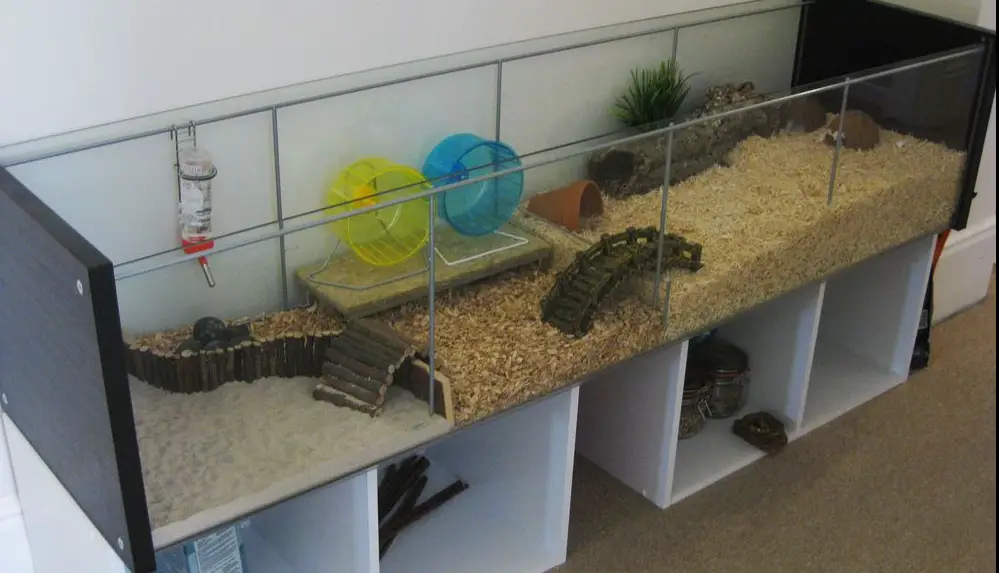- How large should a hamster’s cage be?
- 1- Hamsters have a natural need for space
- 2- Hamsters have an innate need to explore and run
- 3- Hamsters are burrowing animals that need space
- 4- A large cage for your hamsters’ enrichment
- 5- Hamsters produce a lot of waste
- 6- A large cage keeps your hamster clean
- 7- A large enclosure to avoid unpleasant odors
- 8- A large cage means no waste of bedding
- 9- Hamsters often try to escape from small cages
- 10- A large cage provides a more consistent habitat for your hamster
- Final thoughts
Despite their small size, hamsters are high-energy animals and need large enclosures so they can satisfy their innate need to explore and expend all their excess energy, as in natural environments, their territory can stretch over hundreds of square feet.
How large should a hamster’s cage be?
A hamster should have a minimum of 1000 square inches as floor area and this is also the minimum space for dwarf hamsters. Many people will tell you that 450 square inches are not enough because once you install all the necessary items, there will be little free space left for your hamster!
An Ikea Detolf (950 square inches) or a large aquarium would be the ideal solution to properly house your hamster
Here are the 10 reasons why your hamster needs the largest enclosure you can get

1- Hamsters have a natural need for space
A male hamster’s territory can be up to 2 hectares and a female hamster’s up to 0.6 hectares. Buying a large cage for your hamster is the first reasonable thing you should do if you really care about his well-being and avoid causing him chronic stress.
A large enclosure will allow you to install all the other elements your hamster will need in its everyday life.
Your hamster may also get pregnant even accidentally and if this happens, she will be needing all the space you could give her.
2- Hamsters have an innate need to explore and run
A hamster can run up to 6 miles (9 km) each night and this is an innate need in hamsters because, in the wild, they spend their nights exploring their territory to gather food, forage, guard their territory, take sand baths or to search for a mating partner.
3- Hamsters are burrowing animals that need space
Hamsters need to create food stashes, tunnels, and caves, they do this to satisfy their need to feel safe and avoid stress.
They need a lot of space to create their network of tunnels for shelter and rooms in the bedding to store food, mainly seeds.
Depriving them of this space will create frustration that will cause them stress and trigger diseases.
4- A large cage for your hamsters’ enrichment
Hamsters are very active animals, especially after dark, and to provide them with something to occupy their time, you’ll need a large enclosure to house everything they’ll need, including
- A shelter
- An exercise wheel to keep them happy and fit.
- A network of tubes and tunnels
- A large sandbox
- A staircase that leads to a small balcony or hammock
- Their food and water bowls
- Branches and chew toys (Gnawing blocks or sticks)
- A small house to hide treats and seeds
- Ponds and other decorations
- A small area for a different substrate
5- Hamsters produce a lot of waste
Hamsters produce a lot of waste, including a lot of urine and feces, and the problem is that they don’t often relieve themselves in just one spot.
The larger their enclosure, the better, and a large cage will give them clean areas to rest, play and create tunnel entrances and will also give you clean areas where you can hide seeds to keep them busy.
6- A large cage keeps your hamster clean
The larger your hamster’s enclosure, the cleaner your hamster will stay and avoid contact with its own waste.
Hamsters move around a lot and if the cage is too small, they will probably have to go over their poop areas, which will soil their fur and risk contaminating their food and causing diseases like wet tail.
7- A large enclosure to avoid unpleasant odors
The larger your hamster’s cage is, the less often you will have to clean it. If you house your hamster in a small cage, you will have to clean it more frequently to avoid nasty odors and the proliferation of bad bacteria and diseases that these colonies of bacteria and fungi can lead to.
The bad smells will quickly lead to respiratory diseases in your hamster and reduce its lifespan.
8- A large cage means no waste of bedding
When you put your hamster in a large enclosure, you won’t have to change all the bedding and nesting material every time you clean the cage, which is every week.
You will just do spot cleaning every 2 days to change the little bit of pee-soiled bedding and change just the top and bottom layer of bedding during the regular cage cleaning so that you don’t destroy your hamster’s tunnels.
This will save you money and avoid stressing your hamster, as they hate it when you touch their territory and especially their hiding places and food stock.
9- Hamsters often try to escape from small cages
The other reason why you should choose a large cage for your hamster is to avoid feeling cramped and spend most of its time trying to escape from its cage.
If your hamster is kept in a smaller cage, it will quickly develop the bad habit of bare-biting and its life expectancy will quickly decrease due to stress, not to mention the risk of contracting diseases related to stress, lack of exercise, poor hygiene, and bad odors.
10- A large cage provides a more consistent habitat for your hamster
When you put your hamster in a large enclosure, you will be able to use more bedding which will ensure a stable temperature for your hamster and which will not easily go down or up every time you air the room for example.
Hamsters are very sensitive to sudden changes in temperature which can quickly become fatal for them, so opt for a large cage to ensure the well-being of your hamster.
Final thoughts
Let me finish with this truth that not everyone will like: hamsters should never live in an enclosure because if you want their well-being, you will need at least a one-acre enclosure.
The least you can do is to find them an enclosure of at least 1000 square inches and take them out of their cage regularly so they can explore more space why not give them free access to a room in your house after making it safe for them of course.


